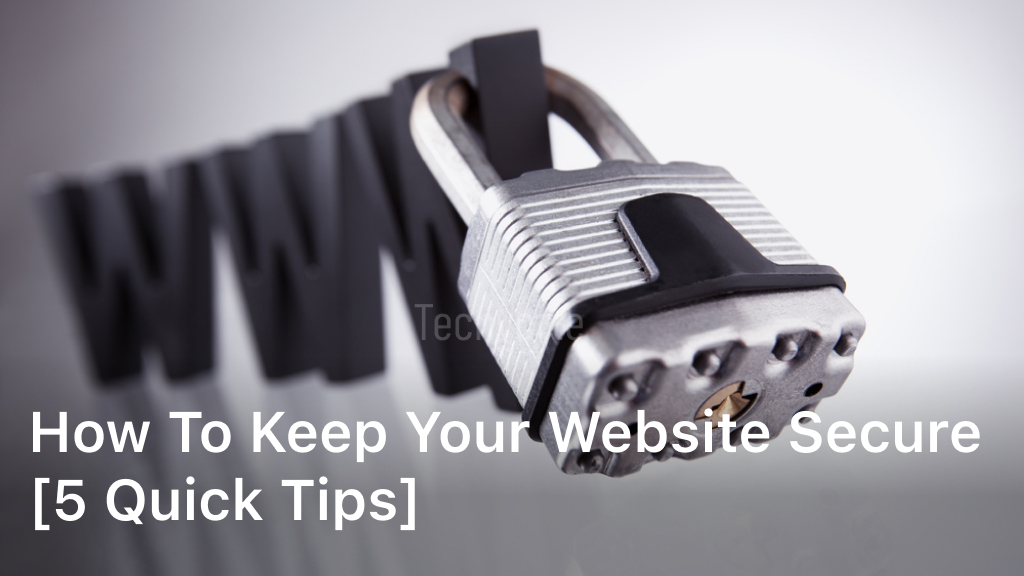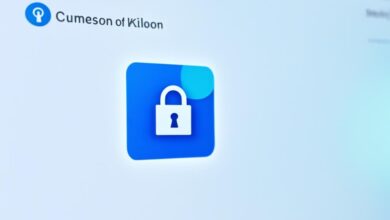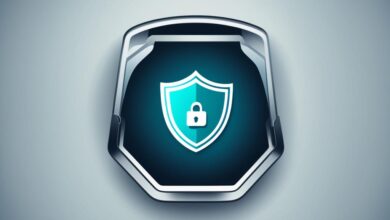Welcome to our guide on website security best practices and website protection tips.
In today’s digital landscape, keeping your website secure is of utmost importance.
Implementing the right website security measures can help safeguard your online presence from threats and ensure the smooth functioning of your website.
In this section, we will discuss five quick tips on how to keep your website secure.
By following these website protection tips, you can protect your website from potential vulnerabilities and stay one step ahead of cybercriminals.
1. Use Strong and Unique Passwords

One of the fundamental web security practices is using strong and unique passwords for your website’s admin accounts and login credentials.
This website security measure is crucial for protecting your website from hackers who often try to gain unauthorized access.
2. Keep Your Software Updated
Keeping your website’s software up to date is one of the essential website security practices that you should prioritize.
Regularly updating your website’s content management system (CMS), plugins and other software components is crucial in securing your website from potential threats.
By staying up to date, you can patch any vulnerabilities that hackers may exploit, ensuring that your website remains secure and protected.
Securing your website from threats involves staying vigilant and proactive in maintaining the latest software versions.
Here are a few reasons why keeping your software updated is essential:
- Protection Against Exploited Vulnerabilities: Hackers are constantly looking for security loopholes in outdated software to gain unauthorized access or compromise your website’s data. By keeping your software updated, you can stay one step ahead by patching these vulnerabilities, making it more challenging for attackers to exploit.
- Enhanced Website Security: Outdated software can become a significant security risk, as it may lack the necessary security features and protocols to protect your website. Regular updates often include security enhancements and bug fixes, ensuring that your website is equipped to defend against evolving threats.
- Compatibility with New Features: Updates not only address security issues but also introduce new features and improvements. By keeping your software up to date, you can take advantage of these enhancements, making your website more functional and user-friendly.
Implementing regular updates should be a standard part of your website security essentials.
Create a schedule to regularly check for updates and install them promptly.
Remember to backup your website’s data before performing any updates to mitigate any risks that may arise.
By following these web security practices and keeping your software updated, you can effectively secure your website from potential threats and ensure a safe online environment for your users.
3. Implement HTTPS Encryption
Secure your website with HTTPS encryption to protect data transmitted between your website and visitors’ browsers.
HTTPS encrypts data, preventing it from being intercepted or tampered with by attackers.
Obtain an SSL/TLS certificate from a trusted certificate authority (CA) and configure your website to use HTTPS.
Many web hosting providers offer free SSL certificates, making it easier than ever to enable HTTPS encryption.
Besides enhancing security, HTTPS also boosts trust and credibility, as modern browsers display a padlock icon for secure websites.
4. Implement Regular Backups
Securing your online presence is essential for maintaining website security.
One crucial step in safeguarding your website is implementing regular backups.
By regularly backing up your website’s data, you can minimize potential damage in the event of security breaches or data loss.
Here are some website protection tips to help you make the most of your backups:
- Create a backup schedule: Establish a regular backup schedule that suits your website’s needs. This could be daily, weekly, or even monthly, depending on the frequency of updates and changes to your website’s content.
- Store backups offsite: It is crucial to keep your backups in a separate location from your website’s server. Storing them offsite ensures that you have access to them even if your website’s server is compromised.
- Test your backups: Regularly test your backups to ensure their integrity. This involves restoring a backup to a separate environment and checking that all data and functionality are intact.
- Consider incremental backups: Instead of performing full backups every time, consider using incremental backups that only capture changes made since the previous backup. This saves time and storage space.
- Use a reliable backup solution: Invest in a reliable backup solution or use website management platforms that offer built-in backup functionalities. This ensures that your backups are automated, secure, and easily accessible.
By implementing regular backups, you can secure your online presence and protect your website’s essential data.
In combination with other website security essentials, such as strong passwords, software updates and two-factor authentication, regular backups play a vital role in maintaining a secure website.
5. Monitor and Audit Your Website Regularly
Regularly monitor your website for suspicious activity, unusual traffic patterns or signs of compromise.
Implement website security tools and services that provide real-time monitoring, intrusion detection and malware scanning.
Conduct regular security audits to identify vulnerabilities and weaknesses in your website’s security posture.
Vulnerability scanners, penetration testing and code reviews can help uncover potential security issues before they are exploited by attackers.
Promptly address any security findings and apply patches or fixes to mitigate risks.
Conclusion
By implementing these five quick tips on how to keep your website secure, you can effectively protect your online presence and maintain a secure environment for your visitors.
Following these website security best practices and website protection tips will help safeguard your website against potential threats and vulnerabilities.
Firstly, using strong and unique passwords for your website’s admin accounts and login credentials is crucial.
This web security practice adds an extra layer of protection and mitigates the risk of unauthorized access by hackers.
Secondly, keeping your website’s software updated is essential.
Regularly updating your CMS, plugins and other software components ensures that potential vulnerabilities are patched, minimizing the risk of security breaches.
Thirdly, enabling two-factor authentication brings an added level of security to your website.
By requiring users to provide two forms of identification, it becomes significantly harder for hackers to gain unauthorized access, enhancing your website’s protection.
Furthermore, implementing regular backups is crucial to secure your online presence.
Backups allow you to restore your website quickly in the event of security breaches or data loss, minimizing potential damage.
Lastly, installing a web application firewall (WAF) adds an additional layer of protection to your website.
This web security measure effectively monitors and filters incoming traffic, safeguarding your website from common web based attacks.
By incorporating these website security measures into your website management routine, you can confidently protect your website and provide a secure experience for your visitors.
Remember, ensuring website security is an ongoing process, and staying vigilant is key to maintaining a safe online presence.
FAQ
How can I keep my website secure?
You can keep your website secure by implementing the following website security best practices and protection tips:
Why is using strong and unique passwords important?
Using strong and unique passwords for your website’s admin accounts and login credentials is crucial to protect your website from hackers who attempt unauthorized access.
How does keeping my software updated enhance website security?
Regularly updating your website’s content management system (CMS), plugins, and other software components helps secure your website from threats by patching potential vulnerabilities.
Why is implementing regular backups important for website security?
Regularly backing up your website’s data is crucial to secure your online presence. In case of security breaches or data loss, having recent backups allows you to quickly restore your website and minimize potential damage.
How does installing a web application firewall help protect my website?
Installing a web application firewall (WAF) adds an additional layer of protection to your website by monitoring and filtering incoming traffic. A WAF helps safeguard your website from common web-based attacks, providing enhanced website security.





